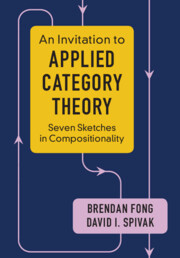Crossref Citations
This Book has been
cited by the following publications. This list is generated based on data provided by Crossref.
Corcoran, Padraig
Mooney, Peter
and
Gagarin, Andrei
2020.
A distributed location obfuscation method for online route planning.
Computers & Security,
Vol. 95,
Issue. ,
p.
101850.
Haruna, Taichi
and
Gunji, Yukio-Pegio
2020.
Analysis and synthesis of a growing network model generating dense scale-free networks via category theory.
Scientific Reports,
Vol. 10,
Issue. 1,
de Carvalho, Daniel
and
Kudasov, Nikolai
2020.
Frontiers in Software Engineering Education.
Vol. 12271,
Issue. ,
p.
151.
Kycia, Radosław A.
and
Niemczynowicz, Agnieszka
2020.
An Explanation of the Landauer bound and its ineffectiveness with regard to multivalued logic.
Technical Transactions,
p.
1.
Halter, Micah
Herlihy, Christine
and
Fairbanks, James
2020.
A Compositional Framework for Scientific Model Augmentation.
Electronic Proceedings in Theoretical Computer Science,
Vol. 323,
Issue. ,
p.
172.
Zardini, Gioele
Milojevic, Dejan
Censi, Andrea
and
Frazzoli, Emilio
2021.
Co-design of Embodied Intelligence: A Structured Approach.
p.
7536.
Smith, Abraham
Bendich, Paul
and
Harer, John
2021.
Persistent obstruction theory for a model category of measures with applications to data merging.
Transactions of the American Mathematical Society, Series B,
Vol. 8,
Issue. 1,
p.
1.
Zardini, Gioele
Censi, Andrea
and
Frazzoli, Emilio
2021.
Co-Design of Autonomous Systems: From Hardware Selection to Control Synthesis.
p.
682.
Kravtsov, G.А.
Kravtsova, N.V.
Khodakovskaya, O.V.
Nikitchenko, V.V.
and
Prymushko, A.N.
2021.
Brain Mathematics and Language. II.
Èlektronnoe modelirovanie,
Vol. 43,
Issue. 4,
p.
69.
Phillips, Steven
and
Beierholm, Ulrik R.
2021.
A reconstruction theory of relational schema induction.
PLOS Computational Biology,
Vol. 17,
Issue. 1,
p.
e1008641.
Virgo, Nathaniel
Biehl, Martin
and
McGregor, Simon
2021.
Machine Learning and Principles and Practice of Knowledge Discovery in Databases.
Vol. 1524,
Issue. ,
p.
726.
Piedeleu, Robin
and
Zanasi, Fabio
2021.
Foundations of Software Science and Computation Structures.
Vol. 12650,
Issue. ,
p.
469.
Vanrietvelde, Augustin
Kristjánsson, Hlér
and
Barrett, Jonathan
2021.
Routed quantum circuits.
Quantum,
Vol. 5,
Issue. ,
p.
503.
Nester, Chad
2021.
Coordination Models and Languages.
Vol. 12717,
Issue. ,
p.
209.
Patterson, Evan
2021.
Hausdorff and Wasserstein metrics on graphs and other structured data.
Information and Inference: A Journal of the IMA,
Vol. 10,
Issue. 4,
p.
1209.
Foley, John D.
Breiner, Spencer
Subrahmanian, Eswaran
and
Dusel, John M.
2021.
Operads for complex system design specification, analysis and synthesis.
Proceedings of the Royal Society A: Mathematical, Physical and Engineering Sciences,
Vol. 477,
Issue. 2250,
Taylor, Sophie Alyx
Tran, Son Cao
and
Nicolau, Dan V.
2021.
Bio-Inspired Information and Communications Technologies.
Vol. 403,
Issue. ,
p.
230.
Bakirtzis, Georgios
Subrahmanian, Eswaran
and
Fleming, Cody H.
2021.
Compositional Thinking in Cyberphysical Systems Theory.
Computer,
Vol. 54,
Issue. 12,
p.
50.
Bakirtzis, Georgios
Vasilakopoulou, Christina
and
Fleming, Cody H.
2021.
Compositional Cyber-Physical Systems Modeling.
Electronic Proceedings in Theoretical Computer Science,
Vol. 333,
Issue. ,
p.
125.
Breiner, Spencer
and
Nolan, John S.
2021.
Symmetric Monoidal Categories with Attributes.
Electronic Proceedings in Theoretical Computer Science,
Vol. 333,
Issue. ,
p.
33.





